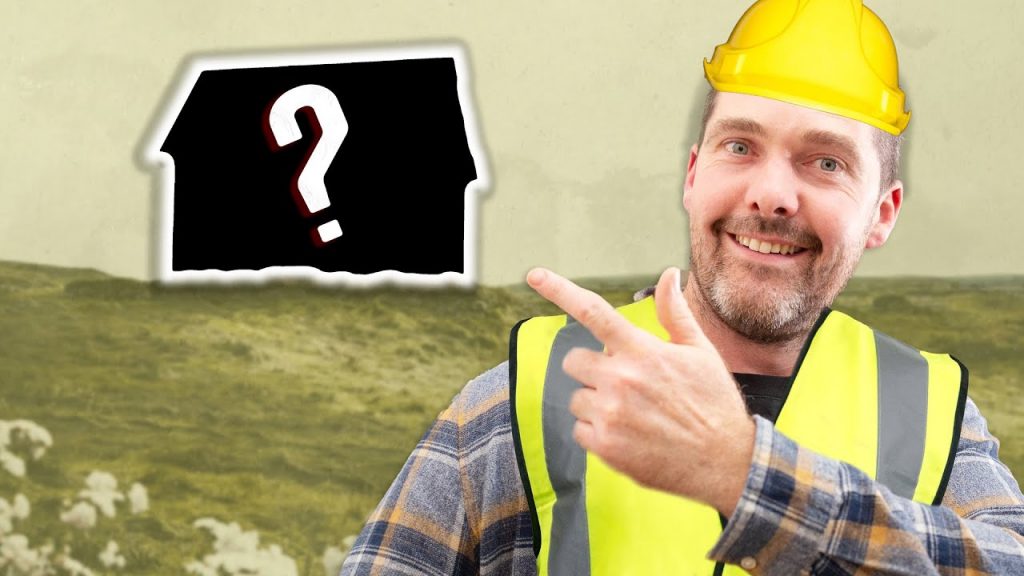Alan Jones and his partner Hannah Boden made more than £300,000 on their first property deal. They bought a plot of land, built their own house on it and sold it later. Since then, the couple have taken on more creative strategies with the help of the Property Investors Academy. As a result, the cash tills are ringing again for Alan and Hannah from providing serviced accommodation. They have also notched up a profit of around £60,000 from a buy, refurbish, refinance project.
‘You can own a property and try any scenario on it.’
Last year was a turning point for Alan and Hannah. Their fourth child was born, and they realised they needed to ‘up their game’ in Hannah’s words. They wanted to grow their wealth to support themselves and to one day hand that over as a legacy to their children.
The nature of Alan’s job also motivated them to go into property.
“I won’t be able to sustain what I do for work forever because your body just doesn’t let you do that. It’s like running the marathon every day. I’m not going to be able to keep working as I do now,” explains Alan.
Their plan was to create a passive income for themselves, using their complementary skills so that when Alan did step away from his trade the family could still live well. Hannah has a merchandising background and is good with figures, while Alan has extensive experience of carrying out renovations, as well as extensions and loft conversions.
Like a lot of builders, he knew all about bricks and mortar but nothing about how to scale a property business. That was why they turned to Samuel Leeds for training and had their eyes opened to the different strategies they could use to make money.
For Hannah joining the Property Investors Academy in 2021 was like putting the ‘jigsaw pieces together’ and finding out how they could combine their abilities.
“One thing I always remember from one of the first courses was you’ve got a tool kit. You could do a lease option, a serviced accommodation, a BRR. You just need to turn up somewhere and go right which one do I need? You have to learn how to use every single one.”
Alan agrees: “You can own a property and try any scenario on it. Sometimes I think it’s just having the marbles to do it.”
The pair met Samuel through mutual friends at church and have prospered from learning how to become ‘property problem solvers,’ as their mentor describes it.
They signed their first rent-to-rent agreement in August on a three-bedroom terraced house after searching Rightmove for a deal and negotiating it with the agent.
“It happened to be an agent who understood what I was trying to do,” says Hannah. “It was an ex-student house, so the landlord wasn’t going to be renting it till the end of September anyway.”
He agreed to her demand for a six-week rent-free period with no deposit to be paid. The only money she had to fork out was the first month’s rent.
Initially, her intention was to rent out the property as a HMO. It had two separate rooms downstairs and a kitchen diner. From her research the numbers looked good.
However, when Hannah advertised it on SpareRoom she received no response.
“The feedback I got was it only had one bathroom and because we were still in Covid times last summer people were hesitant about having one bathroom.”
It was Alan who suggested she try renting it out as serviced accommodation instead. The day after the property was listed, she got her first week’s booking.
Rent-to-serviced accommodation nets over £2K in a month
Hannah faced a steep learning curve when she took on her initial rent-to-rent. It was not simply a case of listing it on booking.com and then waiting for the money to roll in. She had to get linen for the beds and KeySafes so that guests could let themselves in. Automated emails needed to be set up and she had to learn how to process and register payments online.
She also did all the cleaning at first.
“I did about 50 changeovers. I thought it was quite good because I learnt how I wanted it set up and when I did get my cleaners in place, I could tell them this is how I want it, and this is how long it’s going to take you.
“I managed to replace myself at the beginning of this year. I was forced to do it because I dislocated my kneecap. I couldn’t do anything for a while, so I was quickly on the phone trying to find cleaners.”
Alan recognised that they both needed to be focused on finding houses and using their skills where they were best suited.
They chose the rent-to-rent strategy because it gave them a quick source of cash which would free up their time to expand their portfolio. Hannah was also attracted to the hospitality side of offering furnished accommodation on a nightly basis.
Their first rent-to-serviced accommodation property now makes a profit of just over £1,000 a month.
“It already had beds and wardrobes, but we invested about £3,000 on totally redecorating it and buying more stuff for it. We made it into a nice home,” says Hannah.
She adds: “We had a dip over Christmas because I had issues with trying to work out how to use booking.com Once we got that sorted come February, then we started to consistently see that £1,000 coming in.”
At the end of last year Alan and Hannah bought a house in Coventry for £171,000 with a view to renovating it. They spent a further £60,000 on the refurbishment and building an extension at the back.
They are both still in full time employment and so subcontract a lot of the work, although Alan will often put in three to four hours in the evenings to finish a job.
“If you want something badly enough, you’ll work hard for it. Some of those nights at the house it was 12 o’clock at night and I was in the roof insulating.”
His hard work paid off. The couple remortgaged the property after it was revalued at £290,000 – an uplift of £60,000. That meant they had effectively bought a house for about £15,000 because they were able to pull out a large chunk of their investment through the refinance. They are also claiming stamp duty relief.
Hannah points out that not only has the house been improved, but they will be able to recoup that money in less than a year because it is being rented out as serviced accommodation.
“July was a really great month on both the houses. We made a profit of just over £2,000 and it’s been busy ever since.”
The entrepreneurs have also acquired a property in Wolverhampton. Alan says they have not yet decided what they want to do it with it.
“We’re just going to get it to a nice standard, get it evaluated and then reassess from there.”
Like Hannah, he has had to learn the nitty gritty of how to find a site, obtain planning permission, negotiate a deal, structure a joint venture, and work out the end value.
He is philosophical about the ups and downs of the industry.
“What’s the worst that can happen? If you lose a bit of money, you make money. You’ve got to play the long game. We’re making good money on serviced accommodation and that can be good for somebody who wants to get out of the rat race and have their own independence.
“I’d recommend it because it gives you that freedom, but it’s not a five-minute operation to set it up. You’ve got to go and do the work.”
Alan and Hannah purchased the land for their first house 10 years ago when he was 23. It was meant to be their ‘forever home,’ but then their family grew, and they had to move out. Nevertheless, it proved to be a good, long-term investment which gave them a long-term gain. They bought it at auction after the seller turned down their original offer of £150,000 for the site.
Hannah recalls: “We were expecting it to go for some really high figure, but then it didn’t sell. I got on the phone to my dad who’s been like our angel investor and asked him if we could borrow the money.
“We made them lock the doors to the room. They couldn’t let anybody in because everyone else was still out there on the phone trying to sort themselves out. I was like no, we’re good to go. Can we do a deal now? We got a really good bargain on it.”
They made over £300,000 on their purchase, but that was over a long period and after a lot of hard work, says Alan.
In 2019, they went to another auction and bought a flat and a piece of land at the same time. By their own admission they didn’t read the legal pack and ‘rushed in.’
“It’s definitely not worth doing that. You do need to do your paperwork’,” adds Alan.
Even so they owned the flat outright and were making £400 a month on it.
Their goal in the next five years is to be working for themselves full time and concentrating their efforts on property developing. Alan regards that as ultimately far more satisfying than working for someone else.
“I get to see the wealth I’m creating rather than creating it for somebody else. Once a house is finished, I can stand back and do whatever I want with it. If I’m doing it for somebody else all the time, I don’t get that gratification.
“We don’t want to be working for anyone else. We want people working for us.”
Alan and Hannah’s tips
- It doesn’t matter what you do with a property as long as you can keep paying the mortgage and the bills. You can change the strategy.
- Education is key to making good decisions in property.
Samuel Leeds’ verdict
‘Some people making £1,500 a month in a sports shop, for example, just want to secure one or two rent-to-rents and get out. To them making £2,000 a month in passive income is financial freedom. For Alan and Hannah it’s not. They want £10,000 plus and they’ve got different goals. Property can take you wherever you want to go.”
📖 My #1 best selling book is available: School Drop Out to Multi-Millionaire: A Copy and Paste Guide to Getting Seriously Rich
🎥 How to build a property portfolio from scratch in 7 DAYS: https://youtu.be/RWEkj1y8XKs
❓Have a question about property? Join my Property Facebook Group: https://www.facebook.com/groups/
🗣️FOLLOW ME ON SOCIAL MEDIA:
Instagram: https://www.instagram.com/samuelleedsofficial
Facebook Group: https://www.facebook.com/groups/
Facebook Page: https://www.facebook.com/OfficialSamuelLeeds
Twitter: https://twitter.com/samuel_leeds
YouTube: https://www.youtube.com/c/SamuelLeeds






